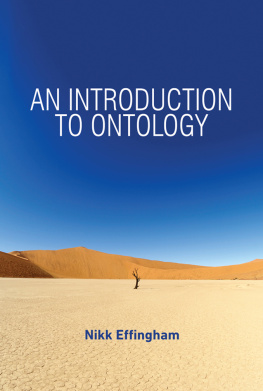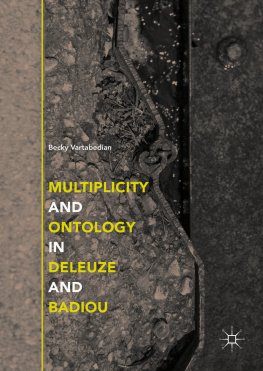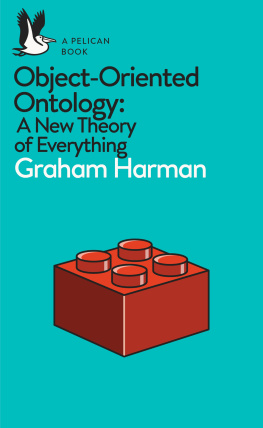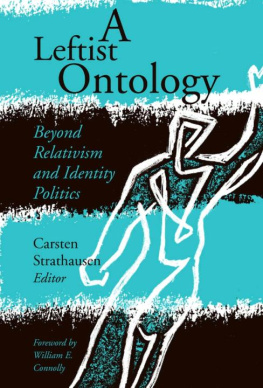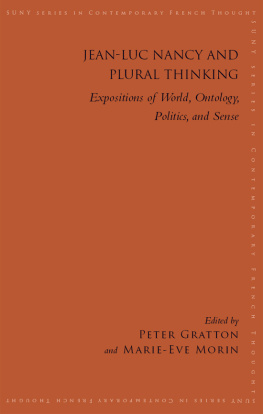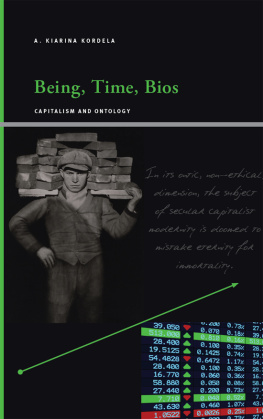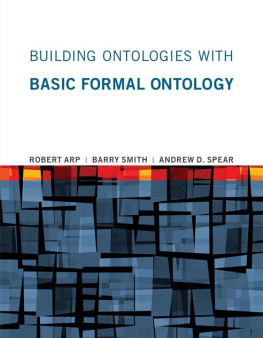Id like to take this chance to thank Richard Woodward and Al Wilson for looking over some/all of this book manuscript; those students from Glasgow and Birmingham who studied on the metaphysics course that helped this book evolve; the staff at Starbucks who always made sure I was supplied with the requisite liquid materials to get the work done (in particular Abi Owen who always keenly asked how many words I was on); and Iain Law, Jussi Suikkanen and Heather Widdows for mostly everything else.
Preface
How this book is arranged
This book is an introductory guide to contemporary ontology in the analytic philosophical tradition, dealing mainly with questions about what things exist, and what those things are like. Except for the first chapter, each chapter examines a different category of entity and the ontological questions surrounding them. However, in ontology, the methodology is itself a prime suspect as a cause of many of the problems. Indeed, recently it has come under renewed scrutiny as philosophers debate exactly how we are meant to answer ontological questions. So every topic-based chapter (except chapter 9) also introduces a different methodological issue for your consideration; in each chapter youll get to see how that methodological principle is meant to work with regard to the category in question, giving you the chance to see it in action.
Chapter 1 is a straightforward introduction to the basics of ontology for those who either dont know what it is, or they know what it is but fear that it doesnt make any sense. Chapter 2 then introduces the Quinean theory of ontological commitment, as well as the notion of theory choice (i.e., how we determine which theory is correct and by what standard such a choice is made), illustrating how these pieces of methodology function by examining the ontology of holes. Chapter 3 turns to the ontology of properties, including questions not just about whether they exist or not but what they are like if they do exist. During the course of that chapter, we introduce the idea of metaphysical explanation and the role it might play in settling ontological questions. Chapter 4 examines whether numbers exist. We also introduce Meinongianism: that theres a difference between what exists and what there is. Chapter 5 turns to modality questions about possibility and necessity and introduces possible worlds. We get to see another theory concerning ontological commitment fictionalism and how that works with regards to possible worlds. Chapter 6 examines whether space (or spacetime) exists. We examine at this stage how scientific theories can feed into metaphysical reasoning. Chapter 7 examines the ontology of things that exist at other times, e.g., whether dinosaurs or Napoleon exist. We also introduce another methodological tool the theory of truthmaking and see how that works with regard to the ontology of time. Chapter 8 examines mereology: the study of parts and wholes. We will look at what composite objects there are, e.g., are there tables, chairs, mountains or goats? If not, how is it that we think there are? In that chapter, we shall examine Neo-Carnapianism, a theory which, if true, would deflate ontological questions to merely being confusions about language. Chapter 9 introduces questions about persistence and whether there are things like statues and people. Finally, in chapter 10, we finish off by deploying a variety of issues from previous chapters to a specific ontological question: whether there are works of music. In that chapter, I end by talking about whether we can distinguish between what exists and what fundamentally exists, and how such a distinction would play a role in practising ontology.
Certainly, if you have never studied ontology, some of the above will sound like a foreign language. Have no fear! Whilst much of ontology sounds initially esoteric, this book will slowly take you through each theory, and each piece of methodology, explaining exactly what is involved and how best to understand it.
What this book assumes
This book is written for philosophy undergraduates but should be suitable for the intellectually sophisticated who are not studying undergraduate courses. Whilst it assumes some passing acquaintance with philosophical theories, all metaphysical and ontological theories will be introduced in detail. What it does assume is the ability to understand first-order predicate logic not the ability to do proofs or truth-tables, but just the ability to read and understand sequents in standard first-order logic.
The symbols I will be using are:
| universal quantifier |
| existential quantifier |
| material conditional (if then) |
| negation (not) |
| & | conjunction (and) |
| inclusive disjunction (or) |
| a , b , c | names |
| x , y , z | variables |
| P, Q, R | propositions |
Those not acquainted with these symbols will be able to find good introductions in a variety of places. I highly recommend Paul Tomassis Logic or, if you want something shorter, Joe Morrisons Logic . However, the level of logical aptitude required is only limited. As long as you can translate things like All balls are round, Nikk Effingham is a philosopher and Some raven is a bird, youll find nothing to worry you here.
What this book leaves unsaid
In many ways, this book is a tissue of lies. It is not a definitive guide to every area of ontology for it is written primarily as a textbook for undergraduates. In light of this, accuracy rightly gives way to pedagogical demands. When reading this book, you should bear in mind how much of what it deals with is contentious, and how what I am offering you are theories for your consideration, not set-in-stone truths dictated to you by some imaginary philosophical establishment. With that in mind, I have not prefaced every sentence with Some philosophers believe or It is arguable that or other phrases to make clear the tendentious nature of the material. To do so would be unduly annoying for you. So bear in mind that for every theory, every position, every argument (heck, every assertion!) contained in this book, there is a serious philosopher somewhere who denies it. Frankly, I find some of the positions youll find in later chapters utterly ludicrous and have had to grit my teeth and force myself to neutrally state the theories as best as possible. But this is a textbook, not a polemic, and its a pedagogical requirement that I present to you these theories as best as I think is possible for you to mull over yourself. Similarly, the vast majority of principles and generalizations I state have innumerable exceptions and tweaks that have been ignored for the sake of brevity I am sure youll encounter many such details as you engage in your independent research and come to see that this introduction glosses over many niceties (which might well prove important to you!). And this is all okay, for the main part of any philosophy course is contained not in your reading this book but in your own independent research and the independent development of the thoughts and theories presented here. So just bear in mind how you should be reluctant to treat everything this book says as (even intended to being!) the last word on the topic at hand.

